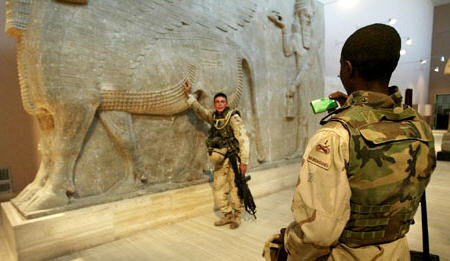The Monuments Men in Modern War





Since WW2, America has sent its soldiers into war with their own "Monuments Men" to preserve and protect a foreign countries art and cultural artifacts. These men and women are not front line troops usually but enter when the scene has been secured when cultural artifacts are in the battle zone. They enter to protect and secure the items from local looters and destruction. Seldom do American troops loot another countries cultural heritage.
Good intentions and awareness does not always work. During the chaos of the battle for Baghdad in 2003, American troops were well aware of the National Museum there with its renowned collection of rare and ancient artifacts of Mesopotamia revered by Iraqis. While they are meaningless to Americans, for the most part, troops leading the spearhead to secure the museum and protect it- failed. During the surrounding battles in the area, Iraqi looters managers to haul off thousands of rare artifacts for which American troops were blamed for. The U.S. military placed special units to track down the stolen items hauled off by Iraqi looters and over time recovered over 6,000 of them(out of 15,000). Some of the items stolen were over 5,000 years old, like the Warka Vase. While a team of detectives recovered stolen artifacts, another team of archeologists began to inventory the thousands still missing in order to create a list so they could not be sold on the "black market". Another team secured the Baghdad Zoo, whose animals were neglected during war or maimed. As if this was not enough to preserve the Iraqi culture, another team secured and protected thousands of books from the basement of Hussein's secret police from ancient Jewish communities. The hidden basement had suffered damage from water and war and the "library" that contained tens of thousands of books Saddam could have ordered destroyed.
But even before the Americans invaded and freed Iraqis in the city of their tyrant, Saddam Hussein, and the rest of the country, the American military had created an extensive list of targets within the city and country to seize and protect. The target list was "no bombing" because of cultural importance to Iraqis. What other country in the world would invade a country and protect their cultural heritage? Few.
Over 2000 sites were on the hit list to protect and secure determined by museum experts with knowledge of Iraqi culture. In Afghanistan, the same caring of culture existed. All combat troops are issued playing cards showing cultural treasures for awareness. Over 40,000 were issued when American troops first entered this war. The Kabul museum was secured and protected with its 33,000 rare cultural objects that were hidden by the staff in order to protect them. American combat troops in both countries were fully aware to try to preserve that countries cultural icons when encountered.
Unlike the local Taliban or al-Qaeda elements in either country, which deliberately destroy cultural heritage to support their oppression, only the American military tries to preserve and protect other countries heritage icons.







